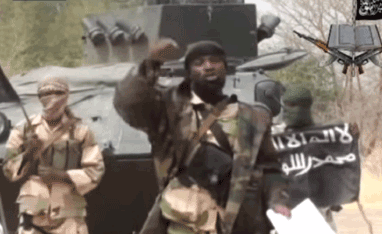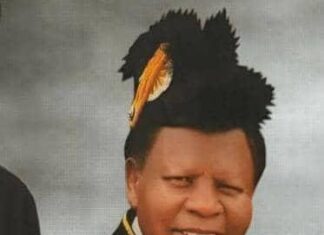The end of the dreaded Boko Haram sect may be in sight, as the joint effort of the Nigerian security forces with neighbouring countries appear to be gaining success, writes Head, News Desk, VICTOR EBIMOMI.

Since 2009 when Boko Haram became notorious in Nigeria, the country has not known peace. Thousands of lives have been lost to the dreaded Islamic sect, especially in the Northern part of the country. The nation’s seat of power, Abuja, is also not spared in the bloodletting acts of the sect, as it has witnessed series of bomb blasts that killed many people. Even the United Nations (UN) facilities in Abuja were not exempted, as the UN building there was reduced to smithereens by suicide bombers from the sect in 2011.
And day-by-day, the sect appears to be more brutal, as it wrecks havocs everywhere, including soft targets such as schools, where it abducted over 200 students at Chibok in Borno State, churches and mosques.
The federal government, since then, has put in everything at its disposal, security-wise, to tame the sect. But little is recorded, as the sect changed tactics every now and then to outwit the security forces.
The resolve of the government to crush the insurgency has even eaten deep into the nation’s purse, thereby affecting developmental projects significantly. Even the nation’s general elections, which was slated to commence on February 14 with presidential and National Assembly ballots, had to be postponed for six weeks, majorly because of the insecurity created by the sect.
Last month, Nigeria got the support of the African continent to partner with other countries, especially its neighbours, to fight the sect. The countries include Cameroon, Chad and Niger. The joint effort of the multi-national force has, however, been paying off, as some of the territories captured by the sect have been reclaimed by security forces.
But analysts believe that no matter the success recorded by the forces, if the leader of the sect, Abubakar Shekau, is not caught, dead or alive, the success won’t last long, as the sect is capable of rejuvenating even in a deadlier way than now. In the past, there had been claims by the security forces that Shekau had been killed, only for him to resurface few days or weeks later, boasting to commit more atrocities.
But there seems to be a ray of hope now. On Wednesday, the Chad President, Idriss Deby, dared the evasive leader, warning him to surrender or risk being killed. The president’s tough stance was based on the fact that his (Shekau) itinerary is now well known.
“Abubakar Shekau must surrender. We know where he is. If he doesn’t give himself up, he will suffer the same fate as his compatriots,” he told a news conference after a regional meeting.
“He was in Dikwa two days ago. He managed to get away but we know where he is. It’s in his interests to surrender,” Deby said, referring to a town in North East Nigeria held by Boko Haram that fell to Chad’s army earlier this week.
The Chadian army is considered one of the best in the region, backed by a strong air force. It first deployed troops to help Cameroon fend off Boko Haram and is now pressing south-west into Nigerian territory after capturing the border town of Gambaru last month.
Chad’s army has waged a series of battles against Boko Haram as part of a cross-border military campaign, and has re-taken a territory the militant group held in North East Nigeria.
Shekau as Boko Haram leader
So analysts say it must be cheering news for the world if Shekau, Nigeria’s most violent terrorists’ leader, is eventually killed. Though terrorism in Nigeria did not begin with Shekau, (militancy had been a negotiating tool in the Niger Delta region), nor did he start Jihadist militancy (Maitasine had attempted that), he nonetheless introduced something novel into it – suicide bombings.
Shekau had been the face, voice and ideology of Boko Haram. His death would naturally be a huge set-back for the group which sees him as invincible. In 2009 when the group was rounded up in Maiduguri by the administration of the late President Umaru Yar’Adua, Shekau was thought to have died. Those who knew him then told our correspondent that if the government had not taken steps to get rid of the group, Shekau would have toppled Muhammed Yusuf, the slain leader of the group who was said to have resisted pressure put on him by Shekau to take up arms against the state.
In 2011, Shekau announced himself as the leader of the militant Islamist group after taking several Jihadist lessons, including making Improvised Explosives Device (IEDs) and the art of suicide bombings from Al-Qaeda operatives in the Maghreb. A BBC report about him said he was a fearless loner, a complex, paradoxical man – part intellectual, part gangster.
Those in Nigeria’s intelligence circle knew that understanding Shekau was the key to understanding Boko Haram and eliminating him was also akin to victory. But this much was appreciated by the United States when it placed a bounty of $7 million (more than N1 billion) on Shekau alone because without him, it would be difficult to find another leader who could motivate members of the group to continue sacrificing their lives.
Ahmed Salkida, a journalist who was part of the group before it became violent, had told the BBC that long before Boko Haram mutated into a killing beast, Shekau had espoused the idea of violence.
“He is one of those who believe that you can sacrifice anything for your belief,” Salkida said. “He hardly talks, he is fearless. He is fluent in his native Kanuri, Hausa and Arabic languages – he does not speak English. I used to joke with him that he should teach me Arabic and I would teach him English.”
Salkida added that Shekau had a photographic memory and was well versed in theology.
“He is nicknamed Darul Tawheed, which translates as a specialist in Tawheed. This is an orthodox doctrine of the uniqueness and oneness of Allah, which is the very cornerstone of Islam,” he said
After its founding in 2002, Boko Haram’s increasing radicalisation led to a violent uprising in July 2009 in which its founding leader, Yusuf, was executed. Its unexpected resurgence, following a mass prison break in September 2010 was accompanied by increasingly sophisticated attacks, initially against soft targets, and progressing in 2011 to include suicide bombings of police buildings and the UN’s office in Abuja. The government’s establishment of a state of emergency at the beginning of 2012 extended in the following year to cover the entire North East of the country. But the state of emergency has now been lifted.
Even Shekau might have foreseen his own end. With his vow that the general elections in Nigeria billed for March 28 and April 11 will not hold, whether he is alive or dead, may be a testimony.
But if he is resolute to his vow, in the face of joint military effort to stop him, his death knell may soon sound. Moreso when the federal government led by President Goodluck Jonathan said it has acquired military hardware that will march those of the insurgents.













